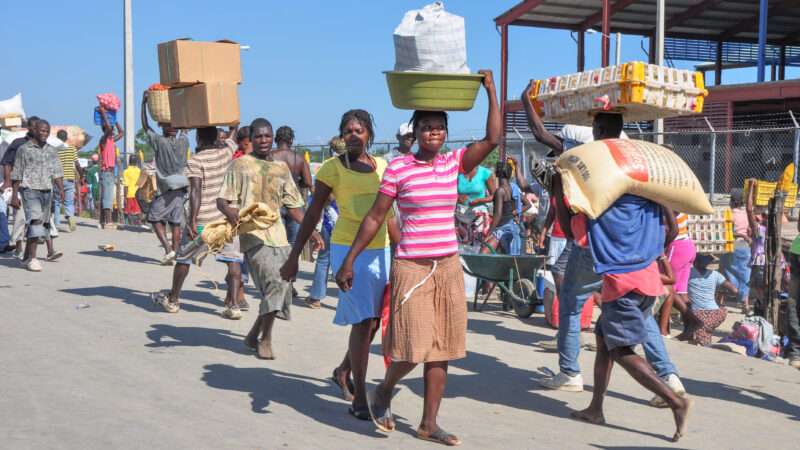
From cholera to gang violence to a potential economic collapse, the people of Haiti are enduring an ongoing existential crisis. Some members of Congress believe the best way to help the Caribbean nation is for the State Department to conduct an investigation that would “lay the groundwork for U.S. sanctions and cooperative international crackdowns” against the gangs who’ve taken control in Port-au-Prince.
This is not the way to improve conditions in Haiti.
“The nature of gangs is they don’t pay much attention to sanctions, although some of their supporters might, and those who are supplying them from abroad might,” Keith Mines, Director of the Latin America Program at the United States Institute for Peace, wrote to Reason. Reports show that gangs control 40 percent of the capital city. That means identifying sanction targets would be difficult and would inevitably harm people who live under gang rule. In 2019, Gary Chartier, a law professor at La Sierra University, wrote for Reason that sanctions “are frequently unfair because they are cast much more widely than their stated rationales would permit.”
To help the people of Haiti, the U.S. should instead reform immigration pathways for Haitians who want to come to America, and remove the bureaucratic barriers that complicate efforts by American NGOs and businesses to support Haitians who want to stay in the country.
A Cato report issued in 2021 found that Haitians in the U.S. do well in assimilating and finding work. Unfortunately, pathways for asylum have waxed and waned in recent years. “For many years, Haitians who could get to Mexico—often through other countries first—could request asylum at a port of entry along the U.S.-Mexico border and enter the country legally. This was discontinued under President Trump but restarted in recent months,” says David Bier, associate director of Immigration Studies at the Cato Institute.
Even members of Congress who favor sanctions seem to recognize that providing immigration relief is an important aspect of addressing Haiti’s crisis. Rep. Val Demings (D–Fla.), author of the Haiti Criminal Collusion Transparency Act of 2022, called for the “redesignation of Haiti for Temporary Protected Status (TPS) and a renewal of the lapsed Haitian Family Reunification Parole (HFRP) program and called for an immediate halt to deportations of Haitian asylum seekers.”
However, those changes alone are not enough. “The best way to let them in quickly would be to grant them authorization to travel directly from Haiti to the United States as was recently done for Ukrainians,” Bier says.
Supporting NGOs that provide humanitarian support and services to the Haitian people is another good alternative to sanctions. Montie and Dyan Twining run the nonprofit Haiti K12, which helps to provide education to Haitian children. They shared that Haitian public schools can only educate 30–40 percent of the population, and that children who don’t attend public school largely go without formal education. Their nonprofit helps to fund private schools to keep children off the streets and provide them with an education.
One of their greatest challenges has been identifying and training local contacts to administer and run the schools they partner with. The Twinings want to bring Haitians to the U.S. to teach them how to run private schools, allowing them to take those skills back to their home country. However, visa backlogs have prevented them from doing that.
If the U.S. truly wanted to help the Haitian people and provide both short-term support and long-term solutions, they should look to reform immigration pathways and remove barriers for NGOs.
The post Sanctions Are Not the Way to Help Haiti appeared first on Reason.com.
from Latest https://ift.tt/El0gKr4
via IFTTT